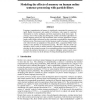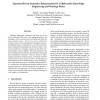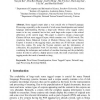142 search results - page 22 / 29 » Disambiguating Highly Ambiguous Words |
NIPS
2008
13 years 9 months ago
2008
Language comprehension in humans is significantly constrained by memory, yet rapid, highly incremental, and capable of utilizing a wide range of contextual information to resolve ...
CICLING
2005
Springer
14 years 1 months ago
2005
Springer
It is relatively common for different people or organizations to share the same name. Given the increasing amount of information available online, this results in the ever growing...
IRI
2007
IEEE
14 years 1 months ago
2007
IEEE
Ontology integration, alignment, and reuse are at the heart of Semantic Web vision. The alignment between two ontologies can be achieved easily provided both share the same axioma...
ENGL
2006
13 years 7 months ago
2006
Recently, there has been a growth in the amount of machine readable information pertaining to the biomedical field. With this growth comes a desire to be able to extract informati...
LKR
2008
13 years 9 months ago
2008
Sense tagged corpus plays a very crucial role to Natural Language Processing, especially on the research of word sense disambiguation and natural language understanding. Having a l...



